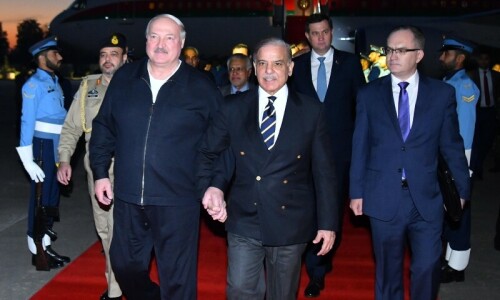
COLOMBO: Once a location of choice for directors shooting World War II classics and big 1980s adventure films, Sri Lanka is hoping to make a comeback on the movie trail as it emerges from civil war.
Since the island's bloody conflict ended in May 2009, the government has been trying to promote a new image focusing on its elegant colonial buildings, tropical jungles and golden beaches.
Post-war ethnic reconciliation is still far from certain after the Tamil Tiger militants were brutally crushed, but there are signs that international studios are again looking to Sri Lanka as a film location.
“Midnight's Children”, the screen adaptation by director Deepa Mehta of Salman Rushdie's 1981 Booker prize-winning novel, was completed in Sri Lanka earlier this year.
The project was shrouded in secrecy to avoid protests by religious groups angered by Rushdie's work, and future films will hope for an easier experience after shooting was suspended at one stage on government orders.
Sri Lanka's next major foreign film is tipped to be “Toomai of the Elephants”, an adaptation of a story from Rudyard Kipling's “Jungle Book”, starring former James Bond actor Pierce Brosnan and veteran Omar Sharif.
Filming is set to begin in January, and many local film professionals see it as a major chance to advertise Sri Lanka as a flexible and attractive film location.
“The post-war era has opened doors for more movies to be shot in Sri Lanka,” Chandran Rutnam, a Sri Lankan film maker who wrote the “Toomai of the Elephants” script, told AFP. “Safety and difficulty to get insurance to cover film productions in Sri Lanka were the biggest drawbacks during the war. People are now willing to invest in films here because we are cheaper than other Asian locations.”
Rutnam knows better than anyone the island's potential as he has worked on more than 50 international projects over the decades.
He was a 16-year-old film hand on the multiple Oscar-winning “The Bridge on the River Kwai” (1957), directed by David Lean and starring Alec Guinness, which was filmed in a valley near the western town of Kitulgala.
Rutnam was also production manager alongside director Steven Spielberg on the 1984 blockbuster “Indiana Jones and the Temple of Doom”. It was shot in and around the royal city of Kandy.
“We are encouraging foreign artists and film crews to shoot in our country to experience its beauty,” Lakshman Yapa Abeywardene, deputy minister of economic development, told AFP.
“The whole country is now open for locations. We see this kind of work promotes our country as a tourist destination, promotes skills and helps local economic activity.”
Abeywardene also said that foreign films would advertise “the vast development work the government has undertaken since the war ended” – a claim that many ethnic-minority Tamils and civil rights groups dispute.
The northeast of the country – where most Tamils live – remains devastated by the fighting, and thousands of civilians in the area were killed by military shelling in the final months of the war according to a United Nations report.
The government denies any wrong-doing and has described demands for a UN inquiry as an attempt to drag Sri Lanka back into conflict instead of building on peace.
For Sri Lanka's film professionals, the arrival of a major new film project cannot come soon enough.
“The end of the war remains the huge plus-point for us to promote Sri Lankan locations among foreign film producers,” P. Samaranayake, a consultant for the National Film Corporation, told AFP.
“As more film crews come here, we are hoping Sri Lanka will be among the top choice of destinations for the next Hollywood thriller... The island's production fraternity of more than 500 film professionals remained active during the war and they are ready and able.”










































Dear visitor, the comments section is undergoing an overhaul and will return soon.